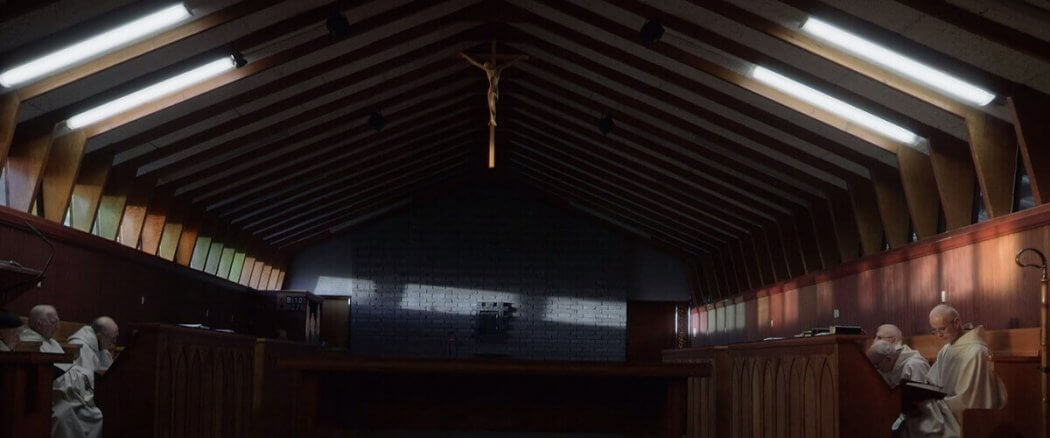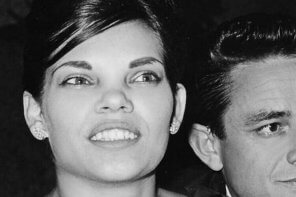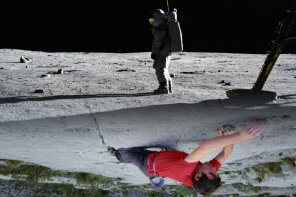Lovers of the Night is equal parts tender and rapturous, acting more as an on-screen relationship than a documentary. With her camera trained on the intimate monotony of everyday life, Anna Frances Ewert takes us into an Irish monastery, imbuing her work with the very soul of its walls and residents. You wouldn’t be mistaken to call it a “traditional” documentary, but to do so would forsake the mysterious sense of knowing Lovers carries. It is beautiful. It is human. And it is, in its best moments, transcendent.
Sometimes all it takes is a movie poster — or even just a brief synopsis — for a cinephile to develop a genuine emotional connection with a film.
It’s an experience every movie lover has felt before, and it probably extends across artistic mediums. Personally, I fell in love with The Social Network’s minimalist marketing campaign before Jesse Eisenberg and Rooney Mara first appeared on my television screen, their whip-fast dialogue battering my mind and ears into glorious submission. Animal Collective’s transportive album Merriweather Post Pavilion took me to another world upon first glance of the album’s artwork, a neon optical illusion, tickling parts of my brain unexercised at that point in my life.
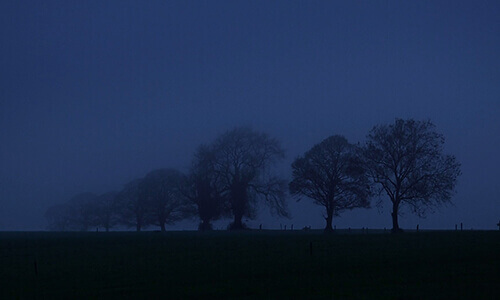 Such was the moment when I first read the synopsis for Anna Frances Ewert’s Lovers of the Night, a film that made its world debut at the 2018 True/False film festival. I reviewed it — along with some other films — on this very website earlier this year. And while I saw a handful of great movies that weekend, perhaps none of them have struck me quite like Ewert’s.
Such was the moment when I first read the synopsis for Anna Frances Ewert’s Lovers of the Night, a film that made its world debut at the 2018 True/False film festival. I reviewed it — along with some other films — on this very website earlier this year. And while I saw a handful of great movies that weekend, perhaps none of them have struck me quite like Ewert’s.
Over the past few months, I’ve had the pleasure of talking with Ewert, a German-Irish filmmaker who has been screening Lovers of the Night at festivals around the world. Upon seeing Lovers of the Night at True/False, I had to know what brought her to this place — to these men — and understand how her film balanced privacy and overwhelming generosity in both love and spirit.
Cinema Faith: What was the initial introduction with the subjects — the monks in the monastery?
Anna Frances Ewert: It was really a friend from Scotland who told me about this place. I studied in Edinburgh for three years, where I made a short documentary (Into the Middle of Nowhere) which was screened at True/False a couple of years ago. She was the founder of the outdoor nursery where I filmed. We became good friends afterwards. Although she was a devoted Buddhist, she also went to this monastery regularly and got on really well with the monks. The monastery meant a lot to her and she was delighted when I told her I would film there because she felt that if this place disappears without it being captured it would be a tragedy. That’s why the film is dedicated to her.
She told me about the monks and their personalities, and it really interested me. It didn’t sound so conventional. There was a lot of humanness, a lot of diversity of character. And I thought, “I’ll have to find out more about this place.” Then I went to Ireland and I found out my Irish grandmother used to go to this monastery. They have a small guest house, and she went there a few times on retreat to replenish and recharge. So that was a surprise to me that my own grandmother used to go there. That’s how it all started.
I fell in love with their beauty and I became more interested in their personal journeys, devotion and experiences.
CF: When you went to the monastery to make the movie, what were your ideas? What were you expecting to see, and what stood out to you as different?
AFE: I’d never been to a Christian monastery, so I had certain ideas of how it would look like. I thought the architecture was going to be more fairy-tale-like: high arches and stone walls steeped in history and a certain secretiveness. And it just wasn’t like that; it was an old farmhouse converted into a monastery. Some people think the church looks more like a stable or riding hall. I don’t see it like that — they built it themselves and I find it very beautiful in its simplicity. It was just a temporary building and they decided to leave it like that.
There are paintings of the Holy Spirit next to paintings of cows. And it doesn’t have quite so much taste, but that’s what I love about it, because it breaks with stereotypes and is very real. With its carpets and the porcelain figures, it’s just wonderfully awkward. So that’s what intrigued me as regards the setting.
On a personal level, as I started talking to the monks, I realized they didn’t pretend to be someone they weren’t. Nor did they try to convert me or impose any religious views on me. I grew up in Germany, but I went to a Catholic school, so I was sort of conflicted around how I felt about Christianity. On the one hand I had a strong wish to understand the initial depth and the mystical dimension of the Christian faith experientially and was particularly interested in how to apply this practically. But on the other hand I felt very frustrated and put off by the superficiality, contradictions and the damage institutionalized Christianity has inflicted on individuals by infusing guilt and shame.
So I came there with a more critical mindset, and I tried to challenge them in my conversations at first.
But it didn’t really go that far, because there was nothing to argue about. Some of the songs they’re singing, they’re very old Catholic stuff, using words like ‘damnation’ and ‘hell’ and ‘sin’ and all these heavy things. So I said to the abbot, “I don’t really see that much love (in these songs) or a lot of compassion.” And he said, “Yeah, you’re absolutely right, they need to be modernized.” And that was the end of the argument!
And then it developed more into a personal relationship with the monks. In a way I fell in love with their beauty and I became more interested in their personal journeys, devotion and experiences rather than any philosophical or political discussions.
CF: So you had somewhat of a faith background. Do you feel like the monks taught you anything? Maybe not even about spiritually, but about the ways religion and humanity intersect?
AFE: I always felt drawn to places where there was a vivid inner life, and that will always interest me. I think what I experienced was… it was one of the places where I felt the most free. More free than in a lot of other places. That’s interesting, because it has many religious rituals, strict rules and structures. But there was an acceptance and an energy that was so loving that I felt that my heart was open most of the time. And this I didn’t find so easily anywhere else. And maybe it surprised me to find this in a monastery.
That sense of longing for the beloved — I can resonate with that; a divine beloved in a way.
One of the things I do really admire and respect is their commitment to their inner life. I think that’s something we can look at, explore and learn from. In many ways I find this is something we’re lacking in our world. Maybe we’re committed to our families and jobs. But beyond that I think there’s an even greater commitment.
The monks have their daily rituals by which they live, to which they need to say “Yes” every day, again and again [such as] seven times praying. They have chosen this path. And this clarity of direction inspires me to think about what is really important to me in my inner journey and in my relationship to the world. “What are the core values by which I want to live my life? Where do I choose to put my life energy? What do I really aspire and what do I want to commit to?“
We can get so lost in the world and in so much doing. There are so many opportunities, so many places to travel, so many things to explore; we want to have a bit of everything. But to learn to come back to myself and look at what’s genuinely important and of value to me. This is something I’ve learned from the monks.
CF: What did it feel like to hear these men talk about the thing they’d committed their lives to in such an affectionate way?
AFE: It was very moving and I think that’s what I really appreciated, being able to experience these moments with the monks. For example, Alberic has this very strong devotional heart and he compares the romance between the soul and God a bit like the one between the lover and the beloved. Maybe it’s a bit romantic, I don’t know. But that sense of longing for the beloved — I can resonate with that; a divine beloved in a way.
It was very touching and precious to me that they opened up to me like this. Especially with them all being men and I was there as a woman but perhaps the fact that I was a woman made it easier for them to talk about these topics.
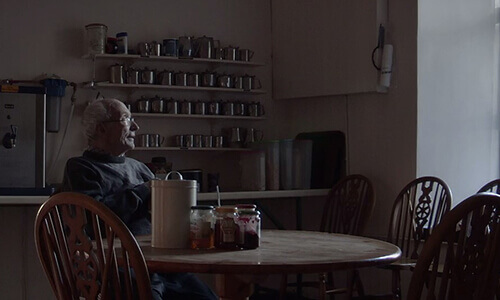 CF: These men obviously recognized their lives were coming to an end. How much of that subject did you want to introduce into the film, and why? How did you approach that topic with them?
CF: These men obviously recognized their lives were coming to an end. How much of that subject did you want to introduce into the film, and why? How did you approach that topic with them?
AFE: For me, it was part of what I was seeing. I felt it was part of the story that this community might not last that much longer. These monks have lived at the monastery for 60 years, and they’re hoping to die there. It’s difficult because when one of them dies, they may not have enough people to keep it going anymore. Being with them and seeing how they aged through the last years made me reflect on my own life and mortality.
When you’re young, you think you’re invincible. Your body is a bit of a slave to your mind. But there comes a point in life where that isn’t possible anymore. For the monks, it’s difficult to come to terms with their increasing fragility. They have lived such independent lives, but they have had to start opening up the community and bring in farmers and nurses and people to cook. They used to do everything themselves!
We don’t want to show our vulnerability. And that starts to crack a little when we get older because you can’t hide it anymore. I think there is something very beautiful about that. It was very touching and very humbling that I got to witness that.
CF: The movie is very funny in a way, almost as if we’re experiencing the simple joys of their everyday, monotonous lives. What was it like to see the simple, humorous moments? What made you decide that was important for people to see?
AFE: Yeah, the humor is definitely part of it — the humor and the Irish wit. I wanted this to be part of the film because I think that’s what makes people form a very quick emotional connection with other people. Often, films about monasteries are quite serious and distanced. So it was really important to me to bring in some lightheartedness and humour while not belittling the difficulties and challenges they are facing.
After the interview, Alberic was very exhausted and said to me, “Anna, I need a drop of whiskey now.”
It was so real. I found much innocence in these little, subtle moments. But I never wanted to laugh at them. I wanted to laugh with them, you know?
CF: That’s definitely there. I felt like I was learning from them; to find the humor in these little things of life that I lose out on so often.
AFE: I think that’s a great thing to explore: the extraordinary in the ordinary. I don’t feel drawn to big topics and am not a filmmaker who makes films about big political or economic issues. I always like to hear about the personal stories. And I like it when it’s a contained environment in which I can really explore and observe what’s happening there. This way I have the time to be present and can get a feeling of what could be interesting.
For example, the scene in which the small figure of Jesus falls off the cross. Some people might say, “Oh that’s a political statement.”
It’s not a political statement for me. I saw this lopsided cross every day and eventually said to Brother Francis, “We have to do something about this. We have to put him back on the cross.” And he came in with the glue… he was just so adorable and innocent in how he did it. It really made me smile and I thought no one would judge them in such a moment.
In this film, there’s a lot we have in common with these monks, even if we ourselves are not religious, yet we might share a longing “to live fully.”
CF: What are your next steps for Lovers of the Night?
AFE: True/False was the world premiere, and it also screened at Full Frame (Durham, NC) and DOXA (Vancouver) and will have its European premiere at Sheffield Doc Fest in Sheffield, England. Beyond that, I don’t know what’s going to happen.
It would be great to find distribution for the film, either online or on TV. I’m hoping that a TV channel might be interested in broadcasting it, possibly in Ireland. I have been contacted by some distribution companies, but you never know what will come of that. Some companies have said, “It’s a nice film, it’s a sensitive film, but it’s not going to stand out in the international competition enough.” It’s not catchy enough, and I understand that! It’s a slow film, and you have to bring time to it and patience, I suppose — a willingness to slow down and move with the pace of the film.
But making this film has been an enriching experience for me. I’ve put a lot of work into it, and it’s been birthed now. So it’s going to take on a life of its own over which I have only limited control. So I’ll wait and see what happens, where it’s supposed to go.
CF: Any other thoughts?
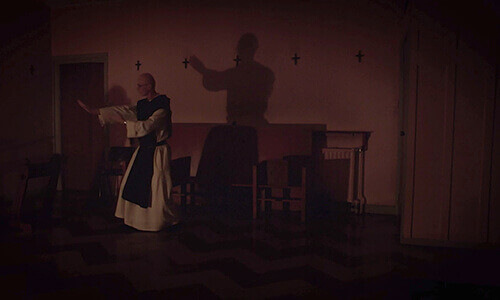
AFE: I think what I love about documentaries is that they sort of go beyond the sense of separation between you and the other person. I’ve made films in different environments, in different countries. I realize over and over again that it doesn’t matter where the person comes from; what their racial or national background is, what their age is or their gender or their sexual orientation. There’s always a possibility to connect. For me that’s beauty, and I feel deeply drawn to exploring that.
In this film, there’s a lot we have in common with these monks, even if we ourselves are not religious, yet we might share a longing “to live fully” as Alberic puts it. I feel that the monks are not so different, and that’s what I wanted to highlight — to question some preconceived notions we might have. Maybe experience some moments where something resonates with you and you say, “Yeah I understand why he thinks that way and I can share his feelings.” I think that when we understand a person’s perspective, we don’t judge so quickly. And for me this is where the power of documentaries lie, that they go beyond the mind and the intellect.
When I see my intentions mirrored back in the feedback I receive from the audience, something in me feels really touched as I didn’t know if what I had hoped to convey would work out. So when someone feels moved after seeing the film it is really encouraging and a wonderful reward.

